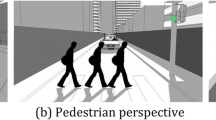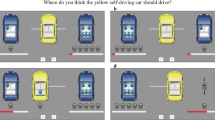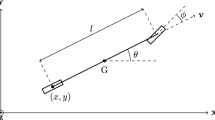Abstract
One of the moral questions concerning autonomous vehicles (henceforth AVs) is the choice between types that differ in their built-in algorithms for dealing with rare situations of unavoidable lethal collision. It does not appear to be possible to avoid questions about how these algorithms should be designed. We present the results of our study of moral preferences (N = 2769) with respect to three types of AVs: (1) selfish, which protects the lives of passenger(s) over any number of bystanders; (2) altruistic, which minimizes the number of casualties, even if this leads to death of passenger(s); and (3) conservative, which abstains from interfering in such situations. We differentiate between scenarios in which participants are to make their decisions privately or publicly, and for themselves or for their offspring. We aim to answer two research questions: (1) whether the public visibility of the choice of an AV type choice make this choice more altruistic and (2) which type of situation makes it more difficult to choose altruistically: when choosing for society as a whole, when choosing only for oneself, or when choosing only for one’s offspring. Our results show that respondents exhibit a preference for an altruistic strategy for AVs and that it is reinforced when signaled to others. The altruistic preference is strongest when applies to everybody else, weaker when it reflects a solely personal choice, and weakest when choosing for one’s own child. We conclude that a public choice is considerably more likely to pressure consumers into accepting a more socially beneficial solution.








Similar content being viewed by others
Data Availability
References
Aoyama Y, Alvarez Leon LF (2021) Urban governance and autonomous vehicles. Cities 119:103410. https://doi.org/10.1016/j.cities.2021.10341
Awad E, Dsouza S, Kim R, Schulz J, Henrich J, Shariff A, Bonnefon JF, Rahwan I (2018) The moral machine experiment. Nature 563(7729):59–64. https://doi.org/10.1038/s41586-018-0637-6
Bereczkei T, Birkas B, Kerekes Z (2010) Altruism towards strangers in need: costly signaling in an industrial society. Evol Hum Behav 31(2):95–103. https://doi.org/10.1016/j.evolhumbehav.2009.07.004
Bonnefon JF, Shariff A, Rahwan I (2016) The social dilemma of autonomous vehicles. Science 352(6293):1573–1576. https://doi.org/10.1126/science.aaf2654
Brown M, Sacco DF (2017) Is pulling the lever sexy? Deontology as a downstream cue to long-term mate quality. J Soc Pers Relat 36(3):957–976. https://doi.org/10.1177/0265407517749331
Buunk AP, Massar K (2012) Intrasexual competition among males: competitive towards men, prosocial towards women. Personal Individ Differ 52(7):818–821. https://doi.org/10.1016/j.paid.2012.01.010
Chehri A, Mouftah HT (2019) Autonomous vehicles in the sustainable cities, the beginning of a green adventure. Sustain Cities Soc 51:101751. https://doi.org/10.1016/j.scs.2019.101751
Contissa G, Lagioia F, Sartor G (2017) The Ethical Knob: ethically-customisable automated vehicles and the law. Artif Intell Law 25(3):365–378. https://doi.org/10.1007/s10506-017-9211-z
Cugurullo F (2017) Exposing smart cities and eco-cities: frankenstein urbanism and the sustainability challenges of the experimental city. Environ Plan a: Econ Space 50(1):73–92. https://doi.org/10.1177/0308518x17738535
Cugurullo F (2021) Frankenstein urbanism (Routledge studies in urbanism and the city), 1st edn. Routledge, London
Cugurullo F, Acheampong RA, Gueriau M, Dusparic I (2020) The transition to autonomous cars, the redesign of cities and the future of urban sustainability. Urban Geogr 42(6):833–859. https://doi.org/10.1080/02723638.2020.1746096
Dawkins R, Krebs JR (1978) Animal signals: information or manipulation. Behav Ecol: Evolut Approach 2:282–309
de Sio FS (2017) Killing by autonomous vehicles and the legal doctrine of necessity. Ethical Theory Moral Pract 20(2):411–429. https://doi.org/10.1007/s10677-017-9780-7
Dowling R, McGuirk P (2020) Autonomous vehicle experiments and the city. Urban Geogr. https://doi.org/10.1080/02723638.2020.1866392
Epting S (2018) Automated vehicles and transportation justice. PhilosTechnol 32(3):389–403. https://doi.org/10.1007/s13347-018-0307-5
Fehrler S, Przepiorka W (2013) Charitable giving as a signal of trustworthiness: disentangling the signaling benefits of altruistic acts. Evol Hum Behav 34(2):139–145. https://doi.org/10.1016/j.evolhumbehav.2012.11.005
Foot P (2002) The problem of abortion and the doctrine of the double effect. In: Foot P (ed) Virtues and vices and other essays in moral philosophy. Clarendon Press, Oxford, pp 19–33 (Originally appeared in Oxford Review, 5, 1967)
Gerdes JC, Thornton SM (2016) Implementable ethics for autonomous vehicles. In: Mauer M et al (eds) Autonomous driving. Technical, legal and social aspects. Springer, Berlin/Heidelberg, pp 87–102
German ministry of transportation. Report. (2017). https://www.bmvi.de/SharedDocs/EN/publications/report-ethics-commission.pdf?__blob=publicationFile
Gogoll J, Müller JF (2016) Autonomous cars: in favor of a mandatory ethics setting. Sci Eng Ethics 23(3):681–700. https://doi.org/10.1007/s11948-016-9806-x
Goodall NJ (2014) Ethical decision making during automated vehicle crashes. Transportation Research Record: Journal of the Transportation Research Board 2424(1):58–65. https://doi.org/10.3141/2424-07
Haboucha CJ, Ishaq R, Shiftan Y (2017) User preferences regarding autonomous vehicles. Transp Res Part C: Emerg Technol 78:37–49. https://doi.org/10.1016/j.trc.2017.01.010
Hardy CL, van Vugt M (2006) Nice guys finish first: the competitive altruism hypothesis. Persnal Soc Psychol Bull 32(10):1402–1413. https://doi.org/10.1177/0146167206291006
Hulse LM, Xie H, Galea ER (2018) Perceptions of autonomous vehicles: Relationships with road users, risk, gender and age. Saf Sci 102:1–13
Kagan S (1991) The limits of morality (Oxford ethics series), Revised. Clarendon Press, Oxford
Karvonen A, van Heur B (2013) Urban laboratories: experiments in reworking cities. Int J Urban Reg Res 38(2):379–392. https://doi.org/10.1111/1468-2427.12075
Kraft-Todd GT, Bollinger B, Gillingham K, Lamp S, Rand DG (2018) Credibility-enhancing displays promote the provision of non-normative public goods. Nature 563(7730):245–248. https://doi.org/10.1038/s41586-018-0647-4
Laidre ME, Johnstone RA (2013) Animal signals. Curr Biol 23(18):R829–R833. https://doi.org/10.1016/j.cub.2013.07.070
Lee M, Sul S, Kim H (2018) Social observation increases deontological judgments in moral dilemmas. Evol Hum Behav 39(6):611–621. https://doi.org/10.1016/j.evolhumbehav.2018.06.004
Lin P (2015) Why ethics matters for autonomous cars. In: Maurer M et al (eds) Autonomous driving. Technical, legal and social aspects. Springer, Berlin/Heidelberg, pp 69–85
Luetge C (2017) The German ethics code for automated and connected driving. Philos Technol 30(4):547–558. https://doi.org/10.1007/s13347-017-0284-0
Maurer M et al (2016) Autonomous driving. Technical, legal and social aspects. Springer, Berlin/Heidelberg
Moody J, Bailey N, Zhao J (2020) Public perceptions of autonomous vehicle safety: an international comparison. Saf Sci 121:634–650. https://doi.org/10.1016/j.ssci.2019.07.022
Nielsen TAS, Haustein S (2018) On sceptics and enthusiasts: What are the expectations towards self-driving cars? Transp Policy 66:49–55. https://doi.org/10.1016/j.tranpol.2018.03.004
Noothigattu R, Gaikwad S, Awad E, Dsouza S, Rahwan I, Ravikumar P, Procaccia A (2018) A voting-based system for ethical decision making. In: Proceedings of the AAAI Conference on Artificial Intelligence, vol. 32, no. 1.
Nowak MA, Sigmund K (1998) Evolution of indirect reciprocity by image scoring. Nature 393(6685):573–577. https://doi.org/10.1038/31225
Nyholm S (2018) The ethics of crashes with self-driving cars: a roadmap, I. Philos Compass 13(7):e12507. https://doi.org/10.1111/phc3.12507
Nyholm S, Smids J (2016) The ethics of accident-algorithms for self-driving cars: an applied trolley problem? Ethical Theory Moral Pract 19(5):1275–1289. https://doi.org/10.1007/s10677-016-9745-2
Olivella P, Siciliani L (2017) Reputational concerns with altruistic providers. J Health Econ 55:1–13. https://doi.org/10.1016/j.jhealeco.2017.05.003
Puska P, Kurki S, Lähdesmäki M, Siltaoja M, Luomala H (2016) Male-male status signaling through favoring organic foods: is the signaler perceived and treated as a friend or a foe? Psychol Mark 33(10):843–855. https://doi.org/10.1002/mar.20922
Savulescu J, Kahane G, Gyngell C (2019) From public preferences to ethical policy. Nat Hum Behav 3(12):1241–1243. https://doi.org/10.1038/s41562-019-0711-6
Semmann D, Krambeck HJ, Milinski M (2005) Reputation is valuable within and outside one’s own social group. Behav Ecol Sociobiol 57(6):611–616. https://doi.org/10.1007/s00265-004-0885-3
Shariff A, Bonnefon JF, Rahwan I (2017) Psychological roadblocks to the adoption of self-driving vehicles. Nat Hum Behav 1(10):694–696. https://doi.org/10.1038/s41562-017-0202-6
Talebpour A, Mahmassani HS (2016) Influence of connected and autonomous vehicles on traffic flow stability and throughput. Transp Rest Part c: Emergtechnol 71:143–163. https://doi.org/10.1016/j.trc.2016.07.007
Thomson JJ (1985) The trolley problem. Yale Law J 94:1395–1415
Zahavi A (1975) Mate selection—a selection for a handicap. J Theor Biol 53(1):205–214. https://doi.org/10.1016/0022-5193(75)90111-3
Acknowledgements
RK developed the study concept. RK, MJK, JF were responsible for the study design and data collection. RK performed the data analysis and interpretation under the supervision of JF. RK, DN, DC drafted and all authors revised the manuscript. All authors approved the final version of the manuscript for submission. For comments on earlier drafts of this paper we would like to thank: Světla Hanke Jarošová. We would also like to thank Lenka Příplatová and anonymous reviewers for very useful comments on the revision of this paper.
Funding
This work was supported by the Grant Agency of the Charles University under grant GAUK number 929216; Charles University Research Program under grant UNCE number 204056; and The Technological Agency of the Czech Republic under ETA grant number TL01000467.
Author information
Authors and Affiliations
Corresponding author
Ethics declarations
Conflict of interest
No potential conflict of interest was reported by the authors.
Additional information
Publisher's Note
Springer Nature remains neutral with regard to jurisdictional claims in published maps and institutional affiliations.
Rights and permissions
Springer Nature or its licensor (e.g. a society or other partner) holds exclusive rights to this article under a publishing agreement with the author(s) or other rightsholder(s); author self-archiving of the accepted manuscript version of this article is solely governed by the terms of such publishing agreement and applicable law.
About this article
Cite this article
Kopecky, R., Jirout Košová, M., Novotný, D.D. et al. How virtue signalling makes us better: moral preferences with respect to autonomous vehicle type choices. AI & Soc 38, 937–946 (2023). https://doi.org/10.1007/s00146-022-01461-8
Received:
Accepted:
Published:
Issue Date:
DOI: https://doi.org/10.1007/s00146-022-01461-8




